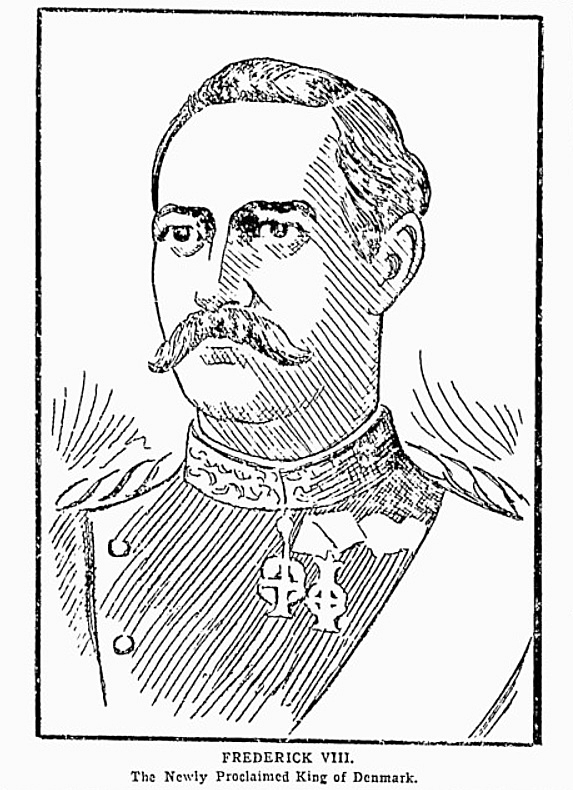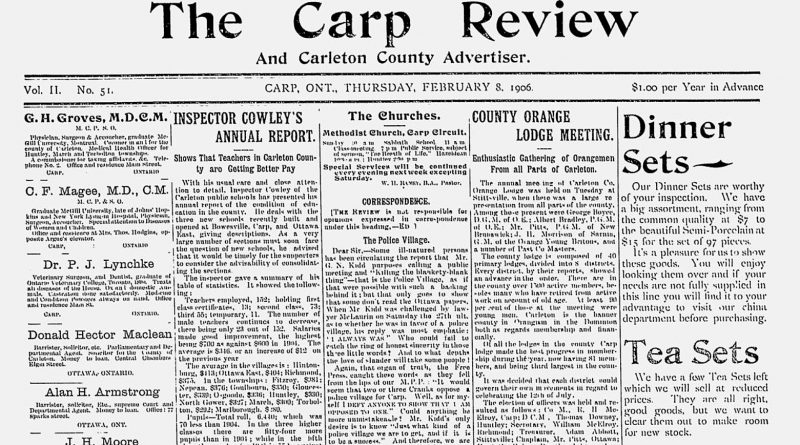Look Back: The Carp Review, Feb. 8, 1906
WEST CARLETON – The front page of the Feb. 8, 1906 The Carp Review focused on education as Inspector Cowley released his annual report on Carleton County public schools.
Inspector Cowley’s Annual Report.

“With his usual care and close attention to detail, Inspector Cowley of the Carleton public schools has presented his annual report of the condition of education in the county,” the Review writes in its lede.
Cowley focused on three “new schools recently built,” in Carp, Bowesville and Ottawa East.
At the time, the county employed 152 teachers.
“The number of male teachers continues to decrease” Cowley said.
Only 23 out of 152 were male.
“Salaries made good improvement,” Cowley said.
The highest annual wage in 1906 was at $700 up from $600 in 1904. The average was $346, up $12 from the year before. The average salary in Fitzroy was $382, Huntley $330, March $300, and Torbolton $292.
There were just more than 6,400 pupils on the county board.
The Police Village.
Also making the front page was a Letter to the Editor on the proposal of turning Carp in to a police village, covered in last week’s column.
“Some ill-natured persons have been circulating the report that Mr. G.N. Kidd proposes calling a public meeting and ‘killing the blankety-blank thing,’ that is the Police Village, as if that were possible with such a backing behind it,” the singularly named Gnostie (the quality of print makes it challenging to make out the letter writer’s name) wrote. “That only goes to show that some don’t read the Ottawa papers. When Mr. Kidd was challenged by lawyer McLaurin on Saturday the 27th (January) as to whether he was in favour of a police village, his reply was most emphatic: ‘I always was.’”
Further on the letter writer states “it would seem that two or three Cranks oppose a police village for Carp. Well, as for myself, I defy anyone to show that I am opposed to it? Mr. Kidd’s only desire is to know just what kind of a police village we are to get, and if it is to be a success?”
The letter writer state encourages the Review’s editor to publish letters from “those places where the system has been in force for some time.”
District News
Dunrobin: The social given in the town hall, South March on the evening of Thursday last (Feb. 1) in aid of the fund of St. Mary’s church, March, was fairly well attended in spite of the stormy night and everyone enjoyed themselves thoroughly.
South March: The weather for the past few days has been the coldest experienced this winter, but as yet there is no sleighing.
The regular monthly meeting of the Woman’s Auxiliary was held at the home of Mrs. W.O. Riddel on Tuesday of last week.
Some of our young gentleman enjoyed a skate to Aylmer and back on the evening of January 30.
Rejoicing and Lamentation.

In world news The Carp Review reports on Denmark’s new king and late ruler.
“The new King Frederick VIII, now reigns over Denmark,” the Review reports. “His accession has been hailed with all the appropriate enthusiast and ceremony, but sorrow for the death of Christian, is the predominant sentiment. The overwhelming grief of the immediate members of this remarkably united family is reflected in every home in Copenhagen.”
Throughout the day bells tolled and minute guns fired.
“In a chamber of the Amalienborg Palace the body of the king lies in the modest bed in which he breathed his last,” the Review reported.
“The dead monarch’s features are unchanged, and are composed as if in sleep other that that of death.”
The Duchess of Cumberland, daughter of King Christian, arrived later in the evening.
“Her sorrow was very great, and it was with difficulty that she was removed from the bedside, where she had knelt for fully an hour in prayer,” the Review wrote.
“King Christian’s last words were addressed to the members of the royal family gathered at his beside yesterday afternoon. They were: God bless you, my children.”
Wild Man of Aylmer.
The Carp Review also reported on a man who had lived in the woods for “six weeks or more.”
“Constables Peters and Pierce have brough in to town a peculiar prisoner,” the Review reported. “The man, who is apparently either a Russian or Austrian, is unable to speak a word of English. Famers living east of here claim that he has been living in Haney’s woods for the past month and a half.”
When captured he was hatless and without an overcoat, wearing only an old ragged suit.
“He made no resistance and seemed to be glad to get in to the jail after sleeping for 40 or 50 nights between logs in the woods,” the Review reports. Magistrate Bradley attempted to question him, but found in an impossible task.”
A resident who understands a little German was able to provide a little translation including the man’s name George Beaudute and that he served in both the Russian and German armies.
“It is claimed that he roamed about the woods armed with a pitchfork, but as far as known, he has never done any damage,” the Review reports. “It is reported that people living near the woods used to leave food for him at the edge of the woods.”
Rescuing Crews Were Cowardly.
The story of the sinking of the Steamship Valencia continues.
“Survivors of Valencia creates sensation at inquiry by accusing relief vessels of refusing to attempt rescue,” the Review reports.
In last week’s column, the Review reported on the sinking of the Valencia. In this week’s column some of the 37 survivors of the 173 on board let their feelings be known during a Feb. 5, 1906 investigation in to the tragedy held in Seattle.
A survivor “explained that he had himself been a sailor, and that the surf which finally battered the Valencia to pieces, could not be called high.”
“Everyone seemed to shun us,” C. Allison told the investigation. “All seemed to be afraid to help or attempt to help the unfortunate men and women who were facing death. All those that succeeded in getting ashore immediately left the scene. The vessels at sea stood off and made no attempt to lower a boat. In the morning when the last raft put off from the Valencia, not a wave had a comber on it. I do not see why a boat could not have been lowered.”











